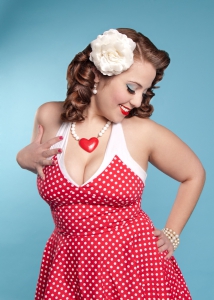
“I was a good-looking kid. I never felt, like, dorky.
I was just like, ‘Yup, these are my braces.
I’ve had them forever.’ “
Emma Stone
Growing up I never doubted I was attractive. As a teenager I pretended to have issues with my appearance to fit in with my friends, but didn’t think any of us actually believed it. I thought it was a game, and complained about my looks for the entertainment value of talking about myself.
It wasn’t until I saw the recent Real Beauty Sketches ad by Dove (viewable at http://www.youtube.com/watch?v=litXW91UauE) that I realized how deeply insecure most people – women especially – are about their bodies, and that my friends were earnest in their complaints.
I cannot explain why I escaped this particular indoctrination by society, or at least have the confidence level of most men. The Dove ad made me believe sharing exactly how and why I know I’m good looking, even on bad days, would be a worthy use of my platform. My article does skew toward women more than men due to the imbalance in our culture, though I know men can benefit as well:
1. Focus on what you like when you look in the mirror
My favorite aspects of my face are my hair, eyes, and mouth. What are yours? Notice them first and often when you see yourself in the mirror, compliment yourself on what you like out loud, and don’t be afraid to give yourself a wink. The more you enjoy what you like about your body, the more things you will see that fit this category.
2. Know that other people don’t see the flaws
You can know you’re good looking without necessarily liking everything about your appearance. There was a time when I hated my jaw line only slightly more than my nose. However, having been continuously frustrated in the attempt to get others to see what was wrong with them I realized my opinion was not shared. And since other people look at me a lot more than I do, I let them win the argument.
De-emphasize how much importance you place on what you don’t like, most of the time others either don’t see it at all or else have a completely different opinion.
3. Be Mindful With Beauty Products
In the recent past I was given an anti-aging kit, and later a dark spot remover for skin, both free. In both instances the gifts sent me spiraling into self-doubt, especially since I hadn’t known dark spots were considered an issue until this product appeared. Using them, I found myself noticing wrinkles and shadows I’d never known were there.
These products had me digging into detailed levels of flaw someone else would have to be standing inordinately close to see (and by the time they were that close they’d better already have a positive view of my appearance).
I’m not saying not to use make up or things that help you feel beautiful (see below), but the beauty industry is in the habit of inventing problems to solve, and the concern is those “problems” revolve around your body. I’ve always felt personally insulted by the idea of concealer, and I can’t help but wonder if it had never been invented if anyone would believe they needed it.
4. Ignore the Hype
If you do an online search of “What Models Really Look Like”, many websites and videos pop up to show you. Here’s one such example:
http://idealbite.com/100-percent-of-what-you-see-in-fashion-magazines-is-retouched/
People look like people. The difference is, people in magazines have not only a hair and make-up crew, but liberally retouched photos. You are already as good looking as the models in magazines, a fact the media is adept at hiding.
Shameless Photography, a company started by photographer Sophie Spinelle, is oriented around giving ordinary people the same kind of treatment models receive and is the source of the photo at the top of this article. I’ve found just viewing her website, www.shamelessphoto.com, to be a nice antidote to the media’s message.
5. Do things that celebrate your beauty
If you like to use make up, view it as a way to celebrate and accent all the things you like about your face. Wear clothes you feel good in that again show off the parts of your body you’re most satisfied with.
Most importantly, eat foods and engage activities that help you feel alive and vibrant.
Beauty is a symptom of living a good life, not the cause. The more engaged with life you are, the more attractive you become in the eyes of others. This is the singular truth of what makes a person good looking, and has absolutely nothing to do with how much they weigh or how many wrinkles they have. If you are vibrantly engaged with life, you radiate a light that everyone responds to. If you are having fun, people will notice and want to be around you.








Leave A Comment